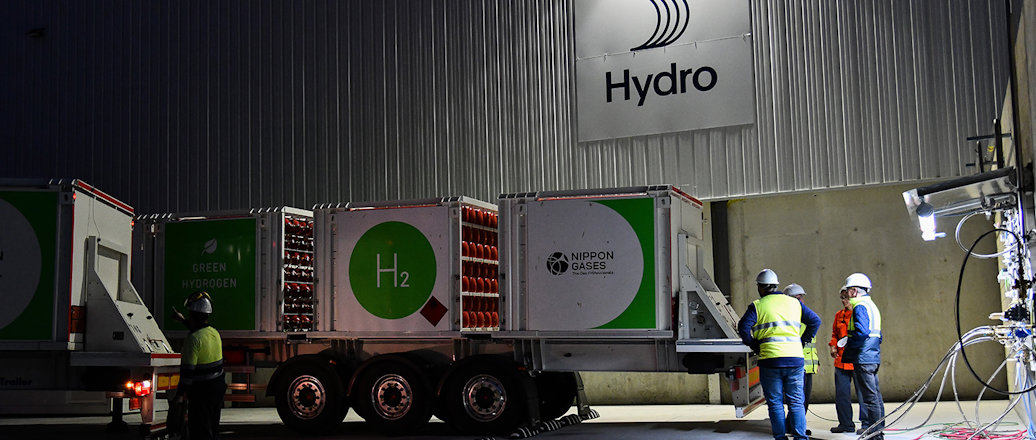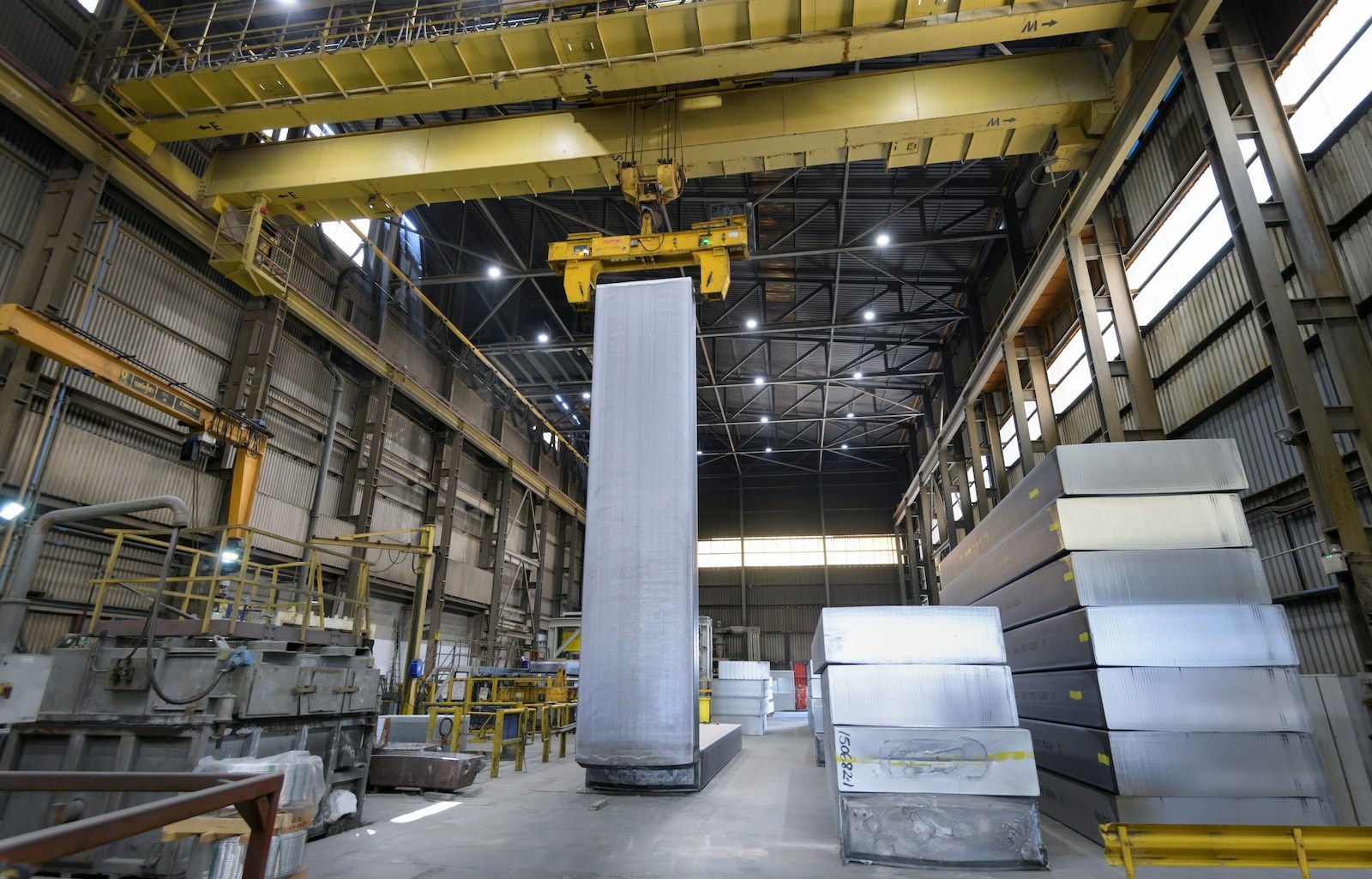As consumers continue to demand more sustainable products, manufacturing companies at every level of the process chain are working to lower their carbon footprint and reduce their environmental impact. In the secondary aluminum industry, one potential method for reducing the carbon impact of the melting process is to utilize green hydrogen (produced by using renewable electricity to split water molecules into hydrogen and oxygen, without emitting any greenhouse gases) as a fuel for the burners powering the furnace.
Both Hydro and Novelis are conducting tests to determine the viability of green hydrogen to produce high quality aluminum in recycling melting furnaces.
Hydro Completes Hydrogen Test in Spain
Hydro has produced the world’s first successful batch of aluminum using green hydrogen as an energy source — another step toward carbon-free aluminum. The test was performed at the casthouse at the company’s extrusion plant in Navarra, Spain, where the aluminum produced will be used to make extruded profiles. The test was conducted and led by hydrogen experts from Hydro Havrand, Hydro’s green hydrogen company, in partnership with Fives, an industrial engineering group with expertise in hydrogen burner technology and solutions for the aluminum industry.
“We are excited to be conducting this test and it demonstrates Hydro’s commitment to decarbonization,” said Paul Warton, executive vice president for Hydro Extrusions. “By removing the carbon emissions from the energy source, we will be able to produce carbon-free aluminum from recycling post-consumer scrap.”

Green hydrogen is one of the most promising emission free fuels to address the hard to abate industry emissions. In the aluminum industry, green hydrogen can replace fossil fuel used for high temperature heating processes. Hydrogen has previously been used in lab scale tests.
The test in Navarra is the world’s first known successful industrial scale test of using hydrogen as an energy source in aluminum production. During the test, carbon-free green hydrogen replaced natural gas as fuel for the recycling of aluminum. Fives contributed with design for the furnace, as well as supplying of key components and controls needed to operate safely and effectively.
The test is providing new insights on fuel switch from natural gas to hydrogen and its effects on metal quality. Hydrogen behaves differently and burns at a different temperature than natural gas. The test is also investigating how these differences affect the aluminum melting process and the aluminum quality. This is a necessary step on the path to maturing the fuel switch solutions of hydrogen in aluminum. The results from this test can also be relevant for using hydrogen in primary aluminum casthouses and in other high temperature processes, like glass or cement.
Hydro and Fives are analyzing the test results, and a final report from the test is expected to be ready in the fall. Hydro Havrand will continue with building capabilities in the fuel switch to hydrogen, aiming to be the leading provider of industrial fuel switch solutions in green hydrogen.
“This test is part of developing commercial fuel switch solutions and to demonstrate that hydrogen can be used in aluminum production,” noted Per Christian Eriksen, Head of Hydro Havrand. “Green hydrogen can remove hard to abate emissions from fossil fuels, in processes where electricity is not an alternative, both in the aluminum industry and in other heavy industries.”
Novelis to Test Hydrogen Use in U.K.
Novelis plans to test the use of hydrogen on one of the recycling furnaces at its plant in Latchford, U.K. The development is is a part of its work with HyNet, a U.K.-based industrial decarbonization project. Through the project which the company has been supporting the development of the regional infrastructure project as well as conducting its own technical feasibility studies on the use of hydrogen as a direct replacement for natural gas.
“We are proud to be one of the pioneers using hydrogen within the aluminum industry and that these trials at Latchford will additionally advance research on the viability of integrating hydrogen power in our recycling operations around the world,” said Allan Sweeney, plant manager, Novelis Latchford.

The Latchford plant is one of Europe’s largest aluminum used beverage can recycling plants and Europe’s largest closed-loop recycling operation for automotive aluminum rolled products, including a collaboration with Jaguar Land Rover. The plant has an annual recycling capacity of up to 195,000 tonnes.
The plant will test the use of hydrogen on one of its recycling furnaces in a demonstration phase in 2024 — thanks to a grant by the U.K. Department for Energy Security and Net Zero. The trial has also been set up in collaboration with Progressive Energy, an independent UK energy company, and requires the installation of new burners and regenerators — both capable of operating with hydrogen or a blended hydrogen/gas input — and replacing the furnace lining material with one suitable for hydrogen.
Depending on the final configuration, replacing natural gas with hydrogen to feed the remelting furnace at the plant could reduce CO2e emissions by up to 90% compared to using the same amount of natural gas.
“Switching to renewable energy sources is a key initiative to advance on our journey toward carbon-neutral production,” said Emilio Braghi, Executive vice president, Novelis and president, Novelis Europe. “Besides decarbonizing our own facility, this collaboration drives the industrial decarbonization of the whole North-West region in UK.”
Suzanne Lindsay-Walker, vice president, Sustainability, Novelis, added, “Decarbonizing our melting processes is a critical lever to achieving our sustainability goals of reducing our carbon footprint by 30% by 2026 and being carbon neutral by 2050 or sooner.”
